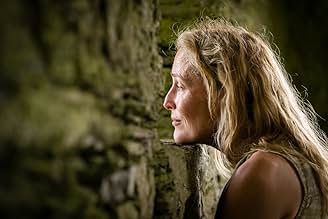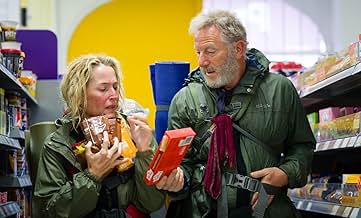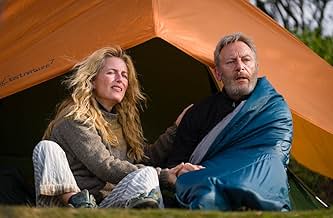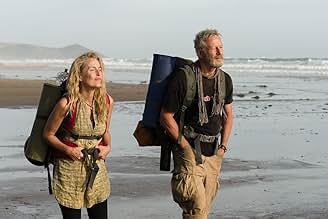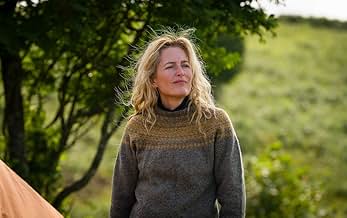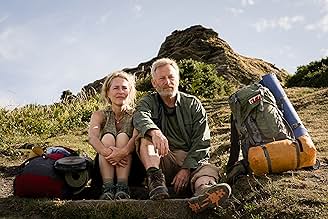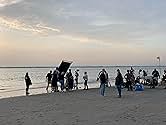Nachdem sie gewaltsam aus ihrer Heimat vertrieben wurden, fasst ein Ehepaar den verzweifelten Entschluss, entlang der Küste Südwestenglands zu wandern, in der Hoffnung, in der Natur Trost un... Alles lesenNachdem sie gewaltsam aus ihrer Heimat vertrieben wurden, fasst ein Ehepaar den verzweifelten Entschluss, entlang der Küste Südwestenglands zu wandern, in der Hoffnung, in der Natur Trost und ein Gefühl der Akzeptanz zu finden.Nachdem sie gewaltsam aus ihrer Heimat vertrieben wurden, fasst ein Ehepaar den verzweifelten Entschluss, entlang der Küste Südwestenglands zu wandern, in der Hoffnung, in der Natur Trost und ein Gefühl der Akzeptanz zu finden.
- Regie
- Drehbuch
- Hauptbesetzung
- Auszeichnungen
- 1 Nominierung insgesamt
Empfohlene Bewertungen
The only redeeming feature of this film for me was the scenery, as I am familiar with this area and have visited much of the coastline. I found the story itself rather slow and pointless. I haven't read the book but know others who have. Perhaps this is one of those books that doesn't transform well into film.
I thought the sound and diction were very poor, and couldn't make out around 25% of Jason Isaacs's mumbled speech. It should be possible for experienced actors to speak with a regional accent (in this case Staffordshire) without mumbling.
Both my wife (who has read the book) and I left the cinema feeling quite underwhelmed.
I thought the sound and diction were very poor, and couldn't make out around 25% of Jason Isaacs's mumbled speech. It should be possible for experienced actors to speak with a regional accent (in this case Staffordshire) without mumbling.
Both my wife (who has read the book) and I left the cinema feeling quite underwhelmed.
As Ray and Moth are on the cusp of retirement, they lose their home and savings in one unlucky swoop. To make things worse Moth is diagnosed with a rare and terminal neurodegenerative disease. In a "glory before death" type of decision, the distraught couple begins a journey on the Salt Path. The 630-mile trail runs along the English coast from Dorset to Somerset. Through good and bad moments including rainstorms, rude people, snoring, physical exhaustion, limping, humor, beautiful scenery, unexpectedly profound moments of insight, deep realizations about each other, and natural wonders, Moth and Ray discover a new definition of "home."
I believe deeply in the healing power of nature for body, heart, mind, and soul. When I go into the natural world, whether in joy or pain, I exit renewed and hopeful. All my life this has been true. This inspiring true story backs up this cherished belief. Along the Salt Path the wonders of nature are experienced in the bird songs, ocean swells, curious seals, sunsets, resplendent forests, and more.
The Salt Path is based on a 2018 memoir of the same name. Director Marianne Elliott relies less on the words of the book, and more on the actual experience of the trail. At this world premiere screening of the film at the Toronto International Film Festival, Elliott said it was challenging to film on location, but the results were worth the cost. Agreed, for the trail is stunningly serene and it speaks for itself.
I believe deeply in the healing power of nature for body, heart, mind, and soul. When I go into the natural world, whether in joy or pain, I exit renewed and hopeful. All my life this has been true. This inspiring true story backs up this cherished belief. Along the Salt Path the wonders of nature are experienced in the bird songs, ocean swells, curious seals, sunsets, resplendent forests, and more.
The Salt Path is based on a 2018 memoir of the same name. Director Marianne Elliott relies less on the words of the book, and more on the actual experience of the trail. At this world premiere screening of the film at the Toronto International Film Festival, Elliott said it was challenging to film on location, but the results were worth the cost. Agreed, for the trail is stunningly serene and it speaks for itself.
As the partner of someone with a severe neurological disability, this movie is a hilarious slap-in-the-face of a "Just walk it off!" that we could not help but laugh at. It doesn't get more literal. I'm sure my partner would if she could! Maybe she should follow suit and just stop taking her meds!
Half an hour in, we couldn't help but think in the cinema "Are we actually enjoying this?" At home, we would have switched it off. I was hoping for something closer to Into The Wild. This is not it. It does not "become" something half way through.
My partner's father walked this path for her for charity and he found the book equally tedious, whiny, and offensive to what the path can actually mean.
The painfully slow reveal of the movie's main driver never fully materialises, leaving you frustrated at the length of the movie.
The overexposed shots of the landscape soured the otherwise wonderful soundscapes, which are particularly good in the theatre. There - that's a star gained!
Overall, this is not the one!
Half an hour in, we couldn't help but think in the cinema "Are we actually enjoying this?" At home, we would have switched it off. I was hoping for something closer to Into The Wild. This is not it. It does not "become" something half way through.
My partner's father walked this path for her for charity and he found the book equally tedious, whiny, and offensive to what the path can actually mean.
The painfully slow reveal of the movie's main driver never fully materialises, leaving you frustrated at the length of the movie.
The overexposed shots of the landscape soured the otherwise wonderful soundscapes, which are particularly good in the theatre. There - that's a star gained!
Overall, this is not the one!
I was lucky enough to see the film at the Picturehouse Central, Piccadilly Circus, with a Q&A afterwards where the writer Raynor Winn, director Marianne Elliott and screenwriter Rebecca Lenkiewicz were joined by actor Jason Isaacs who played Raynor's real life husband Moth.
I'm going to stick my neck out here and maybe even provoke a bit of negativity by saying that isn't a great film.
Don't get me wrong, I anticipate it getting a very solid if not outstanding imdb rating around the 6.7 mark but purely as a film this isn't up there with a work of fiction like say The Shawshank Redemption or even a film based on a true story like The Pursuit of Happyness.
But if you stopped reading there you'd miss a lot about this film and whether you should watch it - because for all of its shortcomings I think a lot of people will enjoy this film and I'd go so far as to say love this film.
So the Salt Path is a film based on the book by the same name by Raynor Winn about a wild camping coastal walk she and her husband undertook following a sudden downturn in their financial fortunes meaning they effectively became homeless late in middle age losing all the material wealth they had worked for in life up to that point. Don't worry by the way, there are no spoilers here and nothing I say will go much beyond what you'd glean from the trailer and film promotion interviews.
So the film is essentially a journey, metaphorically but also literally a long walk in South West England starting in Somerset and intercut with flashbacks. It's not a glamorous Hollywood Thelma and Louise style road trip in an open top car but a rather more reserved and parochial simple backpacking walk along the admittedly equally dramatic and beautiful scenery of the England coastline.
In fact with Moth - yes that's moth like in butterfly - the husband, he has an illness so it's not even a straightforward walk with him often clearly struggling and his wife Raynor, the writer of the book the film is based on, literally physically supporting him.
Now the character names are rather curious but this is a true story so they aren't made up. Moth is reminiscent of the moth that flies too close to the flame and winn is like winner which is ironic given the couple's change of fortunes, the nature of which is gradually revealed to us in flashbacks over the course of their journey.
In the Q&A after the screening reference was made to the film being a three hander with husband and wife of course but nature as the third hand - and there certainly are some beautiful shots of the natural world which provide a variously calming and dramatic backdrop to the physical, mental and emotional challenges faced by the protagonists. Jason Isaacs made the point however that there are other characters in the film and how they perceive and treat the couple is equally telling of humans and society in general and the sometimes flawed judgements we inevitably make.
But I did like this film, I even loved it in parts but by that I don't mean a particular narrative sequence or particular cinematic elements of the medium.
I didn't love it particularly for the story which is engaging though not molded to conform to the traditional Aristotelian dramatic three act or epic hero's journey form.
Neither for the acting which by Gillian and Jason especially is solid, believable and heartwarming.
Nor for the directing which gives us the shots and performances needed to tell the story.
Now Director Marianne Elliott comes from a theatre background and this is her first foray into film. In the Q&A she revealed she wanted her first film to have an older strong female protagonist and be cinematic, playing to the medium's strengths - in fact she chose the screenwriter Rebecca Lenkiewicz for her ability to tell a story without words and the cinematography effortlessly shifts from intimate closeups of the couple to sweeping vista drone shots.
The editing in turn intrigues and satisfies to keep us engaged, the music is moving and the costume and make up well executed - I've never seen Anderson look so convincingly haggard in scenes and the bravery to show herself in that way reminded me of the similarly exceptionally beautiful Nicole Kidman in Destroyer.
But again none of these aspects are why I loved The Salt Path. So if not for story, acting, directing, cinematography, editing, music, costume or makeup then what?
Well, like Oppenheimer, which despite the awards and plaudits, is a very flawed film, this is an important story.
It's a story of the love and resilience of our protagonists but equally ther relationship with the natural world and its power to inspire and heal us - a magical and mystical power that is all the more astonishing by being around us and familiar to us every single day of our lives.
The sense in the film of the love between husband and wife is palpable and the characters themselves are intriguing. We are left wondering what they did in their lives up to where we meet them. Jason Isaac's character, Moth, is an affable polymath who can as easily turn his hand to a spot of DIY as literary analysis of epic poetry.
Now the film never brought me to tears even though the trailer almost did - not least because of the transcendent life affirming score by Chris Roe. And it didn't fill me with inspiration for what humans are capable of in the face of adversity. Neither did it thrill me with twists, turns and clever plot devices.
But what it did do is leave me with a feeling.
The feeling of a real sense of the love between the husband and wife protagonists. A feeling of optimism about our most intimate human relationships - by which I mean our relationships with each other but also our relationship with the natural world we are all part of.
I said this isn't a great film. And I stand by that. There are films that employ the many strengths of the medium better. But it's a film I enjoyed and in many ways loved. I came away from it feeling love - both for the storyteller and the truth behind the story itself.
So not a great film in the traditional sense. But a lovely film! And I wish it every success.
I'm going to stick my neck out here and maybe even provoke a bit of negativity by saying that isn't a great film.
Don't get me wrong, I anticipate it getting a very solid if not outstanding imdb rating around the 6.7 mark but purely as a film this isn't up there with a work of fiction like say The Shawshank Redemption or even a film based on a true story like The Pursuit of Happyness.
But if you stopped reading there you'd miss a lot about this film and whether you should watch it - because for all of its shortcomings I think a lot of people will enjoy this film and I'd go so far as to say love this film.
So the Salt Path is a film based on the book by the same name by Raynor Winn about a wild camping coastal walk she and her husband undertook following a sudden downturn in their financial fortunes meaning they effectively became homeless late in middle age losing all the material wealth they had worked for in life up to that point. Don't worry by the way, there are no spoilers here and nothing I say will go much beyond what you'd glean from the trailer and film promotion interviews.
So the film is essentially a journey, metaphorically but also literally a long walk in South West England starting in Somerset and intercut with flashbacks. It's not a glamorous Hollywood Thelma and Louise style road trip in an open top car but a rather more reserved and parochial simple backpacking walk along the admittedly equally dramatic and beautiful scenery of the England coastline.
In fact with Moth - yes that's moth like in butterfly - the husband, he has an illness so it's not even a straightforward walk with him often clearly struggling and his wife Raynor, the writer of the book the film is based on, literally physically supporting him.
Now the character names are rather curious but this is a true story so they aren't made up. Moth is reminiscent of the moth that flies too close to the flame and winn is like winner which is ironic given the couple's change of fortunes, the nature of which is gradually revealed to us in flashbacks over the course of their journey.
In the Q&A after the screening reference was made to the film being a three hander with husband and wife of course but nature as the third hand - and there certainly are some beautiful shots of the natural world which provide a variously calming and dramatic backdrop to the physical, mental and emotional challenges faced by the protagonists. Jason Isaacs made the point however that there are other characters in the film and how they perceive and treat the couple is equally telling of humans and society in general and the sometimes flawed judgements we inevitably make.
But I did like this film, I even loved it in parts but by that I don't mean a particular narrative sequence or particular cinematic elements of the medium.
I didn't love it particularly for the story which is engaging though not molded to conform to the traditional Aristotelian dramatic three act or epic hero's journey form.
Neither for the acting which by Gillian and Jason especially is solid, believable and heartwarming.
Nor for the directing which gives us the shots and performances needed to tell the story.
Now Director Marianne Elliott comes from a theatre background and this is her first foray into film. In the Q&A she revealed she wanted her first film to have an older strong female protagonist and be cinematic, playing to the medium's strengths - in fact she chose the screenwriter Rebecca Lenkiewicz for her ability to tell a story without words and the cinematography effortlessly shifts from intimate closeups of the couple to sweeping vista drone shots.
The editing in turn intrigues and satisfies to keep us engaged, the music is moving and the costume and make up well executed - I've never seen Anderson look so convincingly haggard in scenes and the bravery to show herself in that way reminded me of the similarly exceptionally beautiful Nicole Kidman in Destroyer.
But again none of these aspects are why I loved The Salt Path. So if not for story, acting, directing, cinematography, editing, music, costume or makeup then what?
Well, like Oppenheimer, which despite the awards and plaudits, is a very flawed film, this is an important story.
It's a story of the love and resilience of our protagonists but equally ther relationship with the natural world and its power to inspire and heal us - a magical and mystical power that is all the more astonishing by being around us and familiar to us every single day of our lives.
The sense in the film of the love between husband and wife is palpable and the characters themselves are intriguing. We are left wondering what they did in their lives up to where we meet them. Jason Isaac's character, Moth, is an affable polymath who can as easily turn his hand to a spot of DIY as literary analysis of epic poetry.
Now the film never brought me to tears even though the trailer almost did - not least because of the transcendent life affirming score by Chris Roe. And it didn't fill me with inspiration for what humans are capable of in the face of adversity. Neither did it thrill me with twists, turns and clever plot devices.
But what it did do is leave me with a feeling.
The feeling of a real sense of the love between the husband and wife protagonists. A feeling of optimism about our most intimate human relationships - by which I mean our relationships with each other but also our relationship with the natural world we are all part of.
I said this isn't a great film. And I stand by that. There are films that employ the many strengths of the medium better. But it's a film I enjoyed and in many ways loved. I came away from it feeling love - both for the storyteller and the truth behind the story itself.
So not a great film in the traditional sense. But a lovely film! And I wish it every success.
A tough watch for anyone who enjoys cinema or literature, THE SALT PATH is the big screen adaptation of Raynor Winn's memoir chronicling the walking holiday around the Cornish coast she took with her husband. I've had the misfortune to read Winn's heavily fictionalised book, and this screen version is even further from reality, heavily dramatised to the degree that another reviewer describing the events depicted as 'authentic' made me laugh out loud. Anderson and Isaacs are both reliable performers - although the former's Staffordshire accent is an unwise choice - but this is an extremely tedious watch, not particularly funny or engaging, with only the natural scenery to recommend it. Even worse, I saw this in the cinema, so there was no getting away, and it takes forever to end as well. A nightmare!
Wusstest du schon
- WissenswertesThe scene where Moth (Jason Isaacs) accidentally prods Raynor (Gillian Anderson) in the face whilst removing his rucksack by the gate near the beginning of the film was an unscripted accident. Director Marianne Elliott liked how the actors stayed in character when it happened and kept it in rather than re-shoot it.
- PatzerAt one point they walk off with the sea on their left hand side.. this would mean they are walking back as their trip was the counter clockwise way..
- Alternative VersionenThe UK release was cut, the distributor chose to reduce the number of uses of strong language in order to obtain a 12A classification. An uncut 15 classification was available.
- SoundtracksWould I Sing
Written by Tim Hollier
Performed by Tim Hollier
Published by Skysail Publishing
By arrangement of Nightjar Music
Top-Auswahl
Melde dich zum Bewerten an und greife auf die Watchlist für personalisierte Empfehlungen zu.
- How long is The Salt Path?Powered by Alexa
Details
Box Office
- Weltweiter Bruttoertrag
- 19.655.234 $
- Laufzeit
- 1 Std. 55 Min.(115 min)
- Farbe
- Seitenverhältnis
- 2.35 : 1
Zu dieser Seite beitragen
Bearbeitung vorschlagen oder fehlenden Inhalt hinzufügen


